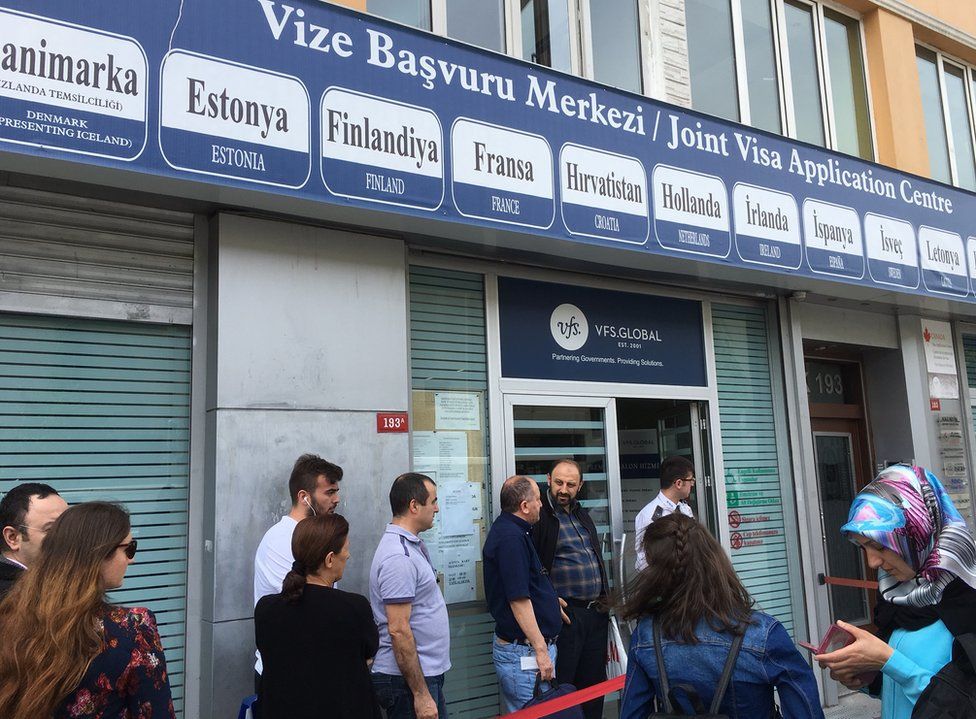Turks look to EU to scrap visas for travel in Europe
- Published

Visa rejection is still a stain on Tan Morgul's memory. "The most insulting time of my life," he says.
A journalist from Istanbul, he was invited in 2010 to attend the centenary celebrations of his favourite football club, St Pauli, in the German city of Hamburg.
"I've travelled all over the world and yet they said I was lying. They didn't believe I wanted to stay in Germany for 10 days and come back again. It's completely against human dignity."
As all Turkish nationals, he had to go through the ritual of a visa application: queuing up at consulates, supplying papers and payment. He assumed it would be accepted. But four hours before his flight, the refusal came through.
"I've seen applicants shivering with fear that they won't be accepted," he says. "We want to travel to expand our minds; it's our basic human right."
That right may finally be given for the 79 million citizens of the Turkish republic.
On Wednesday, the European Commission will deliver a report on whether Turkey has met the 72 criteria to have visa requirements lifted for travel to the Schengen area, which includes most of the EU, though not the UK or Ireland.
It's a quid pro quo for the recent EU-Turkey migration deal.
Turkey accepts failed asylum-seekers deported from Greece and in return Ankara gets more money, progress on its EU accession and longed-for visa-free travel.
If, as expected, the Commission says 'Yes' to visa liberalisation, it would still have to be passed by the European Parliament and the Council of Ministers. But it will have passed the first big hurdle.
It's the culmination of a dream since Turkey applied for EU membership decades ago. Other countries - from Peru to Serbia - have been granted a visa waiver, but somehow the EU remains more apprehensive with Turkey.
"Much of the political elite and public in Europe have the image of millions of Turks flooding into the EU looking for work and sharing benefits, and this is amplified by fears of Muslims taking over Europe," says Senem Aydin Duzgit, the Jean Monet Chair of European Studies at Istanbul's Bilgi University.
"But this is not the case. Visa liberalisation wouldn't give Turkish citizens the right to work in the EU or seek social benefits. It only allows tourist visits without going through bureaucratic hurdles."
'Turkish invasion'
It is a sensitive time in Europe, with right-wing parties and euroscepticism on the rise, feeding the fears about Turkey.
Campaigners for Britain to leave the European Union have used the issue of Turkish accession to bolster their arguments, UK tabloids have warned of the imminent "invasion of Turks".
The Islamist attacks in Paris and Brussels reinforced concerns about freedom of movement and the arrival of more than a million asylum seekers in Europe last year even prompted a de facto suspension of Schengen in some countries as national borders were reinstated.
That phenomenon - the EU's worst migration crisis since World War Two - is what has sped up Turkey's visa deal.
But there is plenty of unease about giving Ankara the concession now, sweeping deficiencies in Turkey's democracy under the carpet for the sake of stemming the migrant flow.
Freedom of expression and the upholding of human rights have plummeted here.
In seven months over 230 people have been investigated for insulting the Turkish President, as Mark Lowen reports
Turkey now ranks 151st out of 180th in this year's press freedom index of the watchdog Reporters Without Borders, embarrassingly wedged between Tajikistan and the Democratic Republic of Congo.
Almost 2,000 cases have been initiated for "insulting the president", with the charge imposed on a range of people, from journalists and MPs to a German satirist and a 12-year-old boy.
The government stands accused of excessive violence in the south-east since a peace process with the Kurdish militant PKK collapsed last year, its military curfews leading to the deaths of civilians.
The divisive President Recep Tayyip Erdogan is perceived to be taking Turkey further away, rather than towards Turkey's European goal.
"The European Union should stick to its principles and use its leverage over Turkey," says Banu Guven, lead anchor of IMC TV, an opposition channel that the government is trying to take off air.
"This visa deal will be seen as a kind of reward for Erdogan's government. If everything is given to the Turkish government, I believe Erdogan won't hesitate to take over the whole media landscape in Turkey."
Europe undeniably has a Turkey problem.
This large and powerful country, split between the European and Asian continents, is too important to ignore.
It may have a government that leaves a bad taste in some European capitals but it still officially aims for EU membership one day, and the process of getting there, including visa-free travel, contains important carrots along the way.
Critics contend that Turkey is throwing the carrots back in EU faces and that leaders like Germany's Angela Merkel are simply stomaching Turkish abuses to save their own skins.
But the reply from Brussels is, "We shun Ankara at our peril".
Outside the visa queue in Istanbul, Tan Morgul is increasingly impassioned.
"Of course it's a relief that we'll probably get the visa deal. But it's so insulting that we'll get it not because of basic human rights but because of the refugees. It is shameful that we and Europe are bargaining with the refugees' lives."
Europe's Schengen area
- Published4 March 2016
- Published24 April 2016
- Published16 April 2015